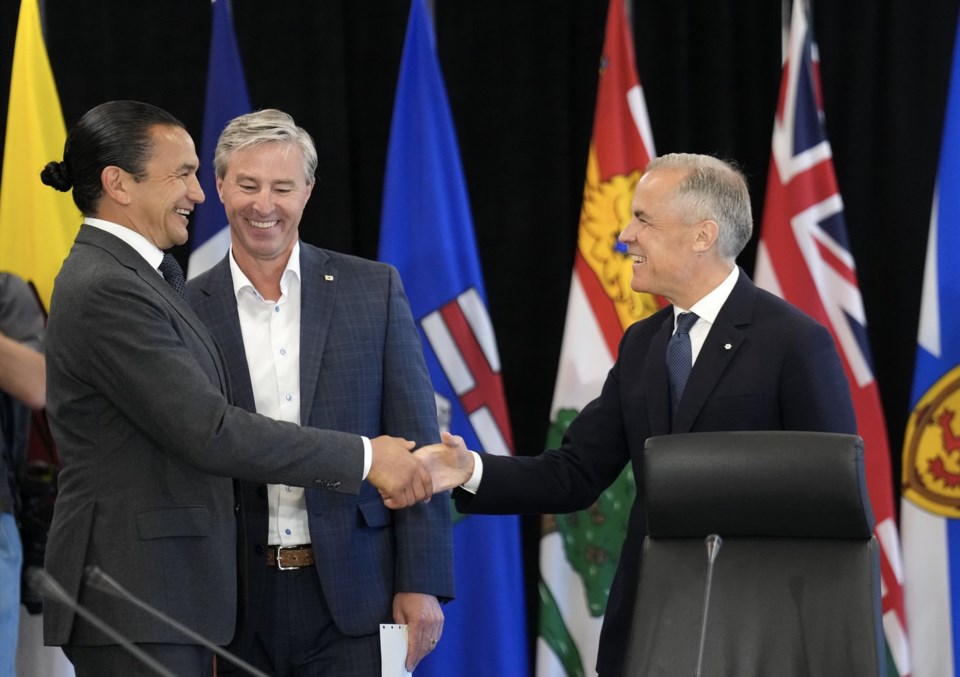OTTAWA — The Canadian Nurses Association says it hopes the new "united Team Canada" approach at the Council of the Federation will lead to harmonization of nurses' licences across the country.
The association was among a number of health-care advocacy groups at the recent annual meeting of Canada's premiers.
While health care tends to take centre stage when the premiers meet, this year's gathering with Prime Minister Mark Carney was dominated by discussion of U.S. President Donald Trump's global trade war.
The nurses association and the Canadian Medical Association have long urged the provinces and territories to ensure licences for doctors and nurses are recognized across the country.
Valerie Grdisa, CEO of the Canadian Nurses Association, said the premiers seemed to approach the meetings this week in Huntsville, Ont., with a new level of co-operation and camaraderie.
Premiers themselves have commented on that new climate of co-operation. New Brunswick Premier Susan Holt told reporters she thinks the group has met more times in the eight months she's been on the job than during her predecessor's six years in office.
The premiers have been in regular contact through the Council of the Federation, and also through first ministers' meetings with Carney, as the country grapples with the impact of constantly shifting U.S. tariffs.
Both levels of government have pledged to open up interprovincial trade and eliminate barriers to labour mobility across the country in an effort to boost the Canadian economy.
The federal Liberals passed a law in June that includes measures to allow some provincially licensed or regulated workers to get the equivalent federal licence — but the law did not include health workers.
Nurses and physicians are licensed in their respective provinces and territories through regulatory bodies.
"We have heard from the nurses across Canada that they do want to see the regulatory bodies kind of unleash and unlock the nursing workforce through harmonizing nursing regulation," Grdisa said in an interview.
In a statement issued at the end of their meeting on Wednesday, the premiers said they will work on improving labour mobility.
"Provinces and territories will work with their respective regulators of health professions and will continue, when appropriate, to implement measures for the recognition of competencies in accordance with their own protection requirements," the statement said.
The Canadian Medical Association also attended the meetings this week to continue lobbying for pan-Canadian licensing for physicians.
Katherine Fierlbeck, a professor of political science at Dalhousie University who studies health policy, said the provinces often pay "lip service" to making those changes.
"In Canada, you've got this horrible situation of sort of a race to the bottom, in which no province has enough health professionals, so everybody's happy to try to poach everybody else's health professionals. And I think there's a little bit of reluctance to actually give that up in practice," she said.
Fierlbeck said jurisdictions that have poured money into opening new spaces to educate physicians and nurses will be reluctant to see them leave for better pay elsewhere.
She also said it's not a surprise to see that health care fell down the list of priorities for premiers.
"I feel for these advocacy groups, because how the heck do you try to push health on the agenda at this particular point in time, knowing that there's so much to be done?" she said.
Grdisa said she felt the premiers were keenly interested in what the nurses association had to say, even if health was not on the agenda until the final morning of meetings.
The group is also working to push for "workforce optimization," which would include allowing registered nurses to prescribe and expand the integration of nurse practitioners in the health system.
"They are completely intrigued, because they need to find solutions that in a way bring better value, so outcomes over cost," Grdisa said.
This report by The Canadian Press was first published July 25, 2025.
Sarah Ritchie, The Canadian Press



